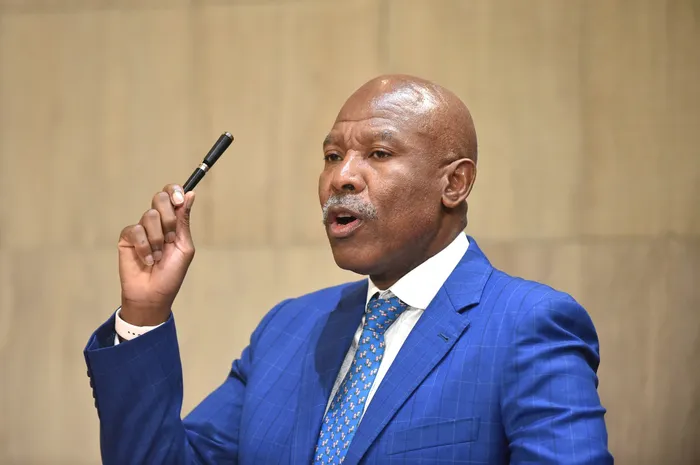
There have been mixed reactions to Reserve Bank Governor Lesetja Kganyago announcing a 25 basis points interest rate cut at the Monetary Policy Committee (MPC) on Thursday.
Image: Thobile Mathonsi / Independent Newspapers
South Africa Reserve Bank (SARB) Governor Lesetja Kganyago announced a 25 basis point cut to the repo rate on Thursday - that was widely expected - bringing it down from 7.50% to 7.25% with some economists welcoming the cut and others criticising its timidity in addressing the nation’s pressing economic woes.
This decision, made by the Monetary Policy Committee (MPC) offers modest relief to borrowers in an economy grappling with sluggish growth and rising unemployment. The decision to cut rates was unanimous, with one MPC member voting a 0.5% cut.
Kganyago said they have now trimmed GDP projections and currently expect growth of 1.2% this year, rising to 1.8% by 2027. “The outlook for structural reforms remains positive, but there are also headwinds like lower global growth. Given the lower forecast, we assess the risks to growth as balanced. Inflation was below 3% again in April. Core inflation came in at 3%, at the bottom of our target range,” he said.
Reza Hendrickse, a portfolio manager at PPS Investments, said the market has been divided regarding a rate cut.
"Doves have argued inflationary pressures are subdued and real interest rates in SA are therefore too high. As such, there is ample scope to cut rates to support economic growth, without stoking inflation. Hawks on the other hand have argued that there is limited room for a cut, given rates are close to the SARB’s neutral level, and global risks are elevated, posing risk to the rand. In addition, although inflation is well below the 4.5% mid-point level, it is currently in the region of where the SARB would like it to be longer term," Hendrickse said.
Dr Roelof Botha, economic Advisor to the Optimum Investment Group, took the hawkish view.
“It should be glaringly obvious that South Africa’s most pressing economic problem is not high inflation, but a lack of adequate economic growth and employment creation,” Botha said. He argued that the real prime rate - currently at 8% after accounting for inflation - remains historically high, representing a 156% increase in the real cost of capital compared to the era of former Governor Gill Marcus, when the economy grew at nearly 3% annually.
Botha said the MPC might be oblivious to the latest Quarterly Labour Force Survey by Statistics SA, which contained the news of higher unemployment. “A quarter of a million people lost their jobs during the first quarter of 2025, which will obviously have a negative impact on taxation revenues and aggravate an already alarming fiscal deficit, not to mention the hardship and increased levels of abject poverty amongst households where the bread-winner is now on the street.”
Botha pointed out that the current economic climate presents an opportune moment for more aggressive rate cuts, similar to those seen during Marcus’s tenure, when the real prime rate averaged 3.1%. “The MPC seems oblivious to the dire unemployment figures and the fiscal deficit’s strain,” he added, warning that the modest cut may fail to stimulate the economy sufficiently.
In contrast North West University Business School economist Professor Raymond Parsons took a dovish view and welcomed the rate cut. “At this stage, even a small reduction in interest rates can have a big positive impact on the national economic mood and on confidence levels. Although it is recognised that monetary policy cannot do the heavy lifting in SA’s growth performance, lower borrowing costs are nevertheless supportive of SA’s incipient but weak economic recovery,” he said.
Parsons pointed out that the reduced growth projections remain indicative of the extent to which the implementation of much-needed structural reforms must be expedited to basically improve SA’s growth prospects.
Efficient Group Chief Economist Dawie Roodt said while reduction in interest rates was "pretty much expected" that he thought there is room for further reduction in interest rates.
"The interesting thing is that the SARB is putting pressure on the Minister of Finance to reduce inflation targets because inflation is below 3% and the SARB would like to see inflation targets at around 3%. I don’t think it would cost the Minister much to reduce inflation targets as inflation is below 3%. We should expect another interest rate cut in July or September,” he said.
Frank Blackmore, the lead economist at KPMG, said that the reason for the rate cut was the low inflation rate. “The Reserve Bank remains data dependent in that respect, as well as the easing of some of the risks such as the exchange rate. Probably another interesting scenario where they're reducing the target rate from a current, 4.5 % objective so the midpoint of the three to 6% range to the 3% objective so the bottom of their three to 6% range.”
BUSINESS REPORT
Related Topics: